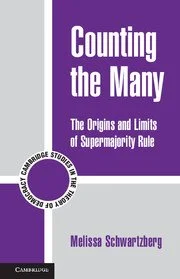We the Entrenched
Americans are stuck with a broken founding charter. Is it time to scrap the Constitution and start over?
Read
The U.S. Constitution is an 18th-century straitjacket. It’s almost impossible to amend, it gives outsize power to small states, and its meaning is subject to the whims of unelected and increasingly intransigent judges. So what’s new? Well, you might be intrigued to learn on this episode just how America might wrench itself out of that morass, short of trashing the Constitution altogether. With the 2022 midterms on the horizon, our two guests offer up a few ideas — some new, some as old as Athens.
Reliance on the judiciary to sort out constitutional questions has become a poisonous political bargain, guests Melissa Schwartzberg and Joseph Fishkin say. Fishkin, a UCLA law professor, argues that progressive wins on the court in the 1950s though the 1970s have given way to an era of right-wing judicial tyranny that asserts the status quo over popular decision-making. Important measures for the 21st century — to protect workers, address climate change and limit the influence of money in politics, for example — now seem totally out of reach. Add to that the constraining effect of the Senate’s supermajority rules, says Schwartzberg, a political scientist at NYU, and you get a classic case of political entrenchment.
One proposition worth considering is whether and how much law professors are to blame for this predicament. Schwartzberg says the legal community has a responsibility to challenge the courts, over and against its perceived professional obligations. Fishkin, for his part, says he and more of his peers, part of a new generation of legal scholars, are ready to pick up that mantle. What they need is the will to reject the conventional reverence for the court, pushing instead for political solutions to limit the justices’ power and offer a more capacious reading of the Constitution.
Meet
Melissa Schwartzberg is a political theorist and the Silver Professor of Politics at New York University. Her work focuses on the historical origins of democracy and ancient Greek institutions. She is the author of Counting the Many: The Origins and Limits of Supermajority Rule (2014, Cambridge University Press). Schwartzberg is a frequent contributor to Vox and the Washington Post.
Joseph Fishkin is a professor of law at the University of California–Los Angeles, and a specialist in constitutional law. His new book, with William Forbath, is The Anti-Oligarchy Constitution: Reconstructing the Economic Foundations of American Democracy (2022, Harvard University Press). Earlier in his career, Fishkin clerked for Chief Justice Margaret H. Marshall of the Massachusetts Supreme Judicial Court. His work has appeared in the Yale Law Journal, the Columbia Law Review and the Supreme Court Review, among other leading journals. Fishkin also blogs at Balkinization. Follow him on Twitter @joeyfishkin.
In Counting the Many, Schwartzberg challenges the idea that supermajority voting structures are necessarily good for building consensus. In practice, she argues, such rules often sideline important voting blocs and promote entrenchment.
Her earlier book, Democracy and Legal Change, argues that being able to change outdated laws is key to a healthy democracy.
With Jack Knight, Schwartzberg considered the literature on democratic decision-making in the Annual Review of Political Science, in 2000. Their paper is titled “Institutional Bargaining for Democratic Theorists (Or How We Learned to Stop Worrying and Love Haggling).”
In The Anti-Oligarchy Constitution, Fishkin and Forbath assert that a core principle of democracy is ensuring broad distributions of wealth. To protect the American political process from being dominated by a “moneyed aristocracy,” they argue, the people must stop the Supreme Court from serving oligarchic interests.
Progressive forces in Congress do have the power to confront the federal courts, Fishkin and Forbath say in a recent essay in the Atlantic. But they need to be willing to make arguments about what kind of economic fairness the constitution intrinsically demands.
At the outset of Ketanji Brown Jackson’s Supreme Court confirmation hearings, Fishkin and Forbath lamented what no one was going to hear in that ceremony: an actual sense of how she might decide cases. This custom shows how deeply the establishment has been sold on the idea that judges are merely “referees” rather than political actors.
Read more from Fishkin on progressive constitutionalism in this June 21 blog post.
Learn
If the legislatures of the 12 smallest states in the Union block a proposed constitutional amendment — and proposing one is hard enough — it would take all of the remaining states, or a combined 96 percent of the U.S. population, to overcome that opposition.
n other words, amending the Constitution is really hard, and it’s only getting harder in today’s political climate. Brush up on Article V and go dep on the amendment process with some historical case studies.
One groundbreaking might-have-been change to the Constitution was the Equal Rights Amendment. It fell short of ratification a half-century ago. Find out what went wrong in this report from NPR, plus: what it would take to revive the cause for formalizing gender equality — and how the amendment’s wording could be improved.
Johnathan S. Gould’s review of The Anti-Oligarchy Constitution examines why progressives are so haunted by Supreme Court deference.
Our fans have probably noticed some recurring themes this season. Jed Purdy, who joined us for our season premier, has called on Americans to view their founding charter as malleable by design, not just the relic of an idealized past.
Is it all right to protest outside the homes of Supreme Court justices when they overturn the will of the people, or should the high court be insulated from the public? This question seems up for grabs all of a sudden. Politico recently noted Senate Majority Leader Chuck Schumer’s casual approval of such activists in the wake of the Dobbs v. Jackson ruling on abortion. In fact, very few other congressional Democrats voiced outright opposition.
In our last episode, we considered a novel approach to limiting the Supreme Court’s power: “jurisdiction stripping.” Here are some more ideas, from researchers Ben Olinsky and Grace Oyenubi of the Center for American Progress. They include establishing 18-year term limits, expanding the lower courts and creating a panel to enforce ethics rules.









